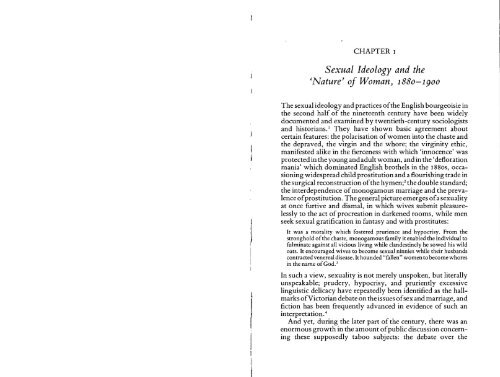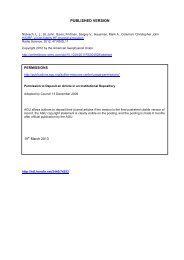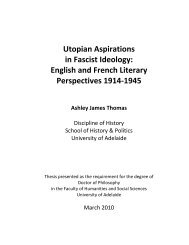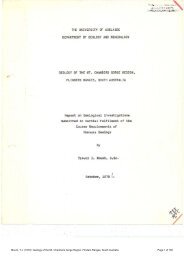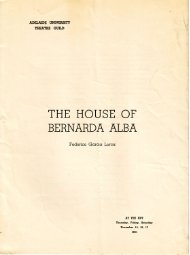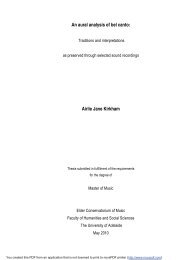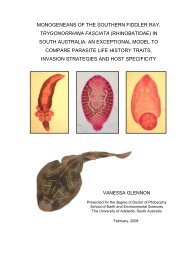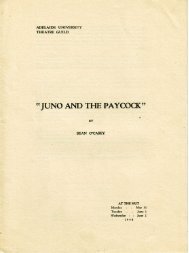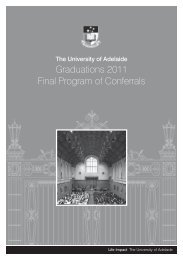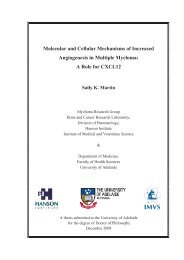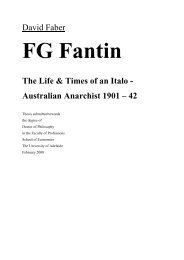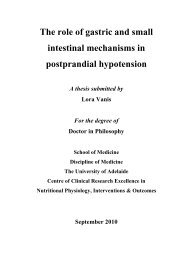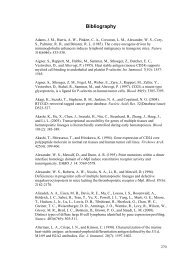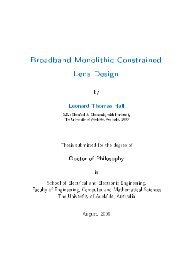Sexual Ideology and the (Nature) of Woman} 1880 ... - Digital Library
Sexual Ideology and the (Nature) of Woman} 1880 ... - Digital Library
Sexual Ideology and the (Nature) of Woman} 1880 ... - Digital Library
You also want an ePaper? Increase the reach of your titles
YUMPU automatically turns print PDFs into web optimized ePapers that Google loves.
CHAPTER I<br />
<strong>Sexual</strong> <strong>Ideology</strong> <strong>and</strong> <strong>the</strong><br />
(<strong>Nature</strong>) <strong>of</strong> <strong>Woman</strong>} <strong>1880</strong>-1900<br />
The sexual ideology <strong>and</strong> practices <strong>of</strong><strong>the</strong> English bourgeoisie in<br />
<strong>the</strong> second half <strong>of</strong> <strong>the</strong> nineteenth century have been widely<br />
documented <strong>and</strong> examined by twentieth-century sociologists<br />
<strong>and</strong> historians. 1 They have shown basic agreement about<br />
certain features: <strong>the</strong> polarisation <strong>of</strong>women into <strong>the</strong> chaste <strong>and</strong><br />
<strong>the</strong> depraved, <strong>the</strong> virgin <strong>and</strong> <strong>the</strong> whore; <strong>the</strong> virginity ethic,<br />
manifested alike in <strong>the</strong> fierceness with which 'innocence' was<br />
protectedin<strong>the</strong>young <strong>and</strong>adult woman, <strong>and</strong>in <strong>the</strong>'defloration<br />
mania' which dominated English bro<strong>the</strong>ls in <strong>the</strong> <strong>1880</strong>s, occasioning<br />
widespread child prostitution <strong>and</strong> a flourishing trade in<br />
<strong>the</strong> surgical reconstruction <strong>of</strong><strong>the</strong> hymen;2 <strong>the</strong> double st<strong>and</strong>ard;<br />
<strong>the</strong> interdependence <strong>of</strong>monogamous marriage <strong>and</strong> <strong>the</strong> prevalence<strong>of</strong>prostitution.<br />
The general pictureemerges<strong>of</strong>a sexuality<br />
at once furtive <strong>and</strong> dismal, in which wives submit pleasurelessly<br />
to <strong>the</strong> act <strong>of</strong>procreation in darkened rooms, while men<br />
seek sexual gratification in fantasy <strong>and</strong> with prostitutes:<br />
It was a morality which fostered prurience <strong>and</strong> hypocrisy. From <strong>the</strong><br />
stronghold <strong>of</strong><strong>the</strong> chaste, monogamous family it enabled <strong>the</strong> individual to<br />
fulminate against all vicious living while cl<strong>and</strong>estinely he sowed his wild<br />
oats. It encouraged wives to become sexual ninnies while <strong>the</strong>ir husb<strong>and</strong>s<br />
contractedvenereal disease. It hounded "fallen" women to becomewhores<br />
in <strong>the</strong> name <strong>of</strong>God. 3<br />
In such a view, sexuality is not merely unspoken, but literally<br />
unspeakable; prudery, hypocrisy, <strong>and</strong> pruriently excessive<br />
linguistic delicacy have repeatedly been identified as <strong>the</strong> hallmarks<strong>of</strong>Victorian<br />
debate on<strong>the</strong> issues <strong>of</strong>sex <strong>and</strong> marriage, <strong>and</strong><br />
fiction has been frequently advanced in evidence <strong>of</strong> such an<br />
interpretation. 4<br />
And yet, during <strong>the</strong> later part <strong>of</strong><strong>the</strong> century, <strong>the</strong>re was an<br />
enormous growth in <strong>the</strong> amount <strong>of</strong>public discussion concerning<br />
<strong>the</strong>se supposedly taboo subjects: <strong>the</strong> debate over <strong>the</strong>
16<br />
Thomas Hardy <strong>and</strong> Women<br />
basis <strong>of</strong>a fixed polaritydfmale <strong>and</strong> female characteristics, at <strong>the</strong><br />
level <strong>of</strong>physiology (<strong>the</strong> controversial question, for example, <strong>of</strong><br />
absolute <strong>and</strong> relative difference <strong>of</strong> brain weight) <strong>and</strong>, by an<br />
unargued extension, at <strong>the</strong> level <strong>of</strong>mental characteristics:<br />
It is generally admitted that with woman <strong>the</strong> powers <strong>of</strong>intuition, <strong>of</strong>rapid<br />
perception, <strong>and</strong> perhaps <strong>of</strong> imitation, are more strongly marked than in<br />
man; but some, at least, <strong>of</strong> <strong>the</strong>se faculties are characteristic <strong>of</strong> <strong>the</strong> lower<br />
races, <strong>and</strong> <strong>the</strong>refore <strong>of</strong>a past <strong>and</strong> lower state <strong>of</strong>civilisatioh. 16<br />
The use <strong>of</strong>phrases such as 'generally admitted' <strong>and</strong> 'perhaps',<br />
<strong>the</strong> blurring <strong>of</strong> social <strong>and</strong> biological causation implicit in <strong>the</strong><br />
'<strong>the</strong>refore', <strong>the</strong> use <strong>of</strong>unsupported empirical observation, <strong>and</strong>,<br />
elsewhere, <strong>of</strong> simple analogy between bodily <strong>and</strong> mental<br />
structures, are all typical <strong>of</strong>Darwin's method <strong>of</strong>argument in<br />
this account <strong>of</strong>mental sexual differences. 17<br />
Darwinism came fairly rapidly to dominate Victorian biology,<br />
butindoingso itposedcertain problems for contemporary<br />
social <strong>the</strong>ory <strong>and</strong> sociology. Sociologists from Spencer <strong>and</strong><br />
Comte worked with biological models <strong>of</strong>social organisation<br />
clearly in mind, but laid a greater stress on environmental<br />
factors, or acquired characteristics, than <strong>the</strong> Darwinian emphasis<br />
on inherited characteristics would support. Thereafter, <strong>the</strong><br />
newly dominant 'scientificism established a new ultimate authority,<br />
<strong>the</strong> ratification <strong>of</strong><strong>the</strong> social status quo by <strong>the</strong> appeal to<br />
'objective' <strong>and</strong> 'universal' physiological laws. The appeal to<br />
science shifts <strong>the</strong> site <strong>of</strong><strong>the</strong> disabilities <strong>of</strong>women from history<br />
to nature, <strong>and</strong> in dOIng so, it undercuts <strong>the</strong> struggle <strong>of</strong>women<br />
against <strong>the</strong>ir oppression. It became necessary, in order to<br />
substantiate this appeal to scientific 'law', to supply <strong>the</strong> link,<br />
un<strong>the</strong>orised in Darwin, between physiological <strong>and</strong> psychological<br />
organisation. Weismann's influential notion<strong>of</strong><strong>the</strong>'germplasm',<br />
first available in English in 1882, was one attempt to do<br />
so, but it did not identify <strong>the</strong> locus <strong>of</strong><strong>the</strong> differentiation <strong>of</strong>male<br />
<strong>and</strong> female mind <strong>and</strong> temperament. It distinguished, ra<strong>the</strong>r,<br />
between <strong>the</strong> unvarying transmissible characteristics <strong>of</strong> <strong>the</strong><br />
'germ-plasm' <strong>and</strong> <strong>the</strong> physiologically individualised 'soma',<br />
<strong>and</strong> this distinction was to lend weight to <strong>the</strong> claims <strong>of</strong><br />
hereditarian eugenists that reforms in welfare <strong>and</strong> social environment<br />
could not improve <strong>the</strong> nation's breeding-stock.<br />
Geddes <strong>and</strong> Thomson ascribed maleness <strong>and</strong> femaleness to a<br />
differentiation <strong>of</strong> cell-metabolism, between <strong>the</strong> 'katabolic'<br />
.,<br />
I<br />
<strong>Sexual</strong> <strong>Ideology</strong> <strong>and</strong> <strong>the</strong> '<strong>Nature</strong>' <strong>of</strong> <strong>Woman</strong><br />
(energy-dispersing) sperm <strong>and</strong> <strong>the</strong> 'anabolic' (energy-conserving)<br />
ovum, a difference which exercised a determining<br />
force over <strong>the</strong> development <strong>of</strong>body <strong>and</strong> mind. 18 Alternatively,<br />
<strong>the</strong> periodicity <strong>of</strong> <strong>the</strong> female physiological processes <strong>of</strong>menstruation,<br />
pregnancy <strong>and</strong> lactation could act as <strong>the</strong> site <strong>of</strong><br />
differentiation; Frederic Harrison, in an address on <strong>the</strong><br />
anniversary <strong>of</strong> <strong>the</strong> death <strong>of</strong> Comte, cites menstruation as <strong>the</strong><br />
reason for <strong>the</strong> disqualification <strong>of</strong>women from participation in<br />
some aspects <strong>of</strong>public life:<br />
But <strong>the</strong>re is one feature in <strong>the</strong> feminine organisation which, for industrial<br />
<strong>and</strong> political purposes, is moreimportant than all. It is subject to functional<br />
interruption absolutely incompatiblewith <strong>the</strong> highest forms <strong>of</strong>continuous<br />
pressure....<br />
Supposing all o<strong>the</strong>r forces equal, it isjust <strong>the</strong> five per cent. <strong>of</strong>periodical<br />
unfitness which makes <strong>the</strong> whole difference between <strong>the</strong> working capacity<br />
<strong>of</strong><strong>the</strong> sexes. 19<br />
This urge to find a biological origin <strong>and</strong> function for <strong>the</strong><br />
difference between <strong>the</strong> sexes <strong>and</strong> for <strong>the</strong>ir differing social roles<br />
can be seen in works which attempt an ambitious syn<strong>the</strong>sis <strong>of</strong><br />
physiology, psychology <strong>and</strong> sociology, such as Ferrerro's The<br />
Problem <strong>of</strong> <strong>Woman</strong> from a Bio-Sociological Point <strong>of</strong> View (Turin,<br />
1893) or Lombroso <strong>and</strong> Ferrerro's La donna delinquente, la<br />
prostituta, e la donna normale (1893). The best-known English<br />
exponent is Havelock Ellis, whose organicist underst<strong>and</strong>ing <strong>of</strong><br />
<strong>the</strong> connection between biological laws <strong>and</strong> social institutions<br />
finds lyrical expression in <strong>the</strong> invocation to science in <strong>the</strong><br />
introduction to The New Spirit (1890):<br />
We know that wherever science goes <strong>the</strong> purifying breath <strong>of</strong>spring has<br />
passed <strong>and</strong> all things are re-created.... We know at last that it must be<br />
among our chief ethical rules to see that we build <strong>the</strong> l<strong>of</strong>ty structure <strong>of</strong><br />
human society on <strong>the</strong> sure <strong>and</strong> simple foundations <strong>of</strong>man's organism.'"<br />
When he comes, in Man <strong>and</strong> <strong>Woman</strong> (1894), to attempt a close<br />
analysis <strong>of</strong> <strong>the</strong> physiological foundations <strong>of</strong> that 'l<strong>of</strong>ty structure',<br />
he devotes a chapter to <strong>the</strong> different mental capacities <strong>of</strong><br />
men <strong>and</strong> women. His conclusions are predictable - women are<br />
more diligent but less rational, quicker <strong>and</strong> more precocious,<br />
but much given to impulse <strong>and</strong> vanity. His method, however,<br />
is interesting - an extraordinary farrago <strong>of</strong> anthropological,<br />
sociological <strong>and</strong> physiological data. A symptomaticexample is<br />
17
18 Thomas Hardy <strong>and</strong> Women<br />
his account, based on La donna delinquente, <strong>of</strong> <strong>the</strong> female<br />
tendency to deceitfulness: its causes include menstruation,<br />
whichis disgusting <strong>and</strong> so obliges women to learn to conceal it,<br />
<strong>and</strong> <strong>the</strong> duties <strong>of</strong>maternity, since much <strong>of</strong><strong>the</strong> education <strong>of</strong><strong>the</strong><br />
young consists in skilful lying. 21<br />
Some feminists, accepting <strong>the</strong> principle <strong>of</strong>inherent sexual<br />
differentiation, argued a different version <strong>of</strong>evolution (all too<br />
<strong>of</strong>ten echoing Darwin's cavalier use <strong>of</strong> 'fact' <strong>and</strong> evidence,<br />
however). Eliza Burt Gamble reviews Darwin's evidence <strong>and</strong><br />
accepts unchallenged only his statement that pairing arouses<br />
distate in females; so she stresses <strong>the</strong> active role <strong>of</strong>females in <strong>the</strong><br />
process <strong>of</strong>sexual selectionin <strong>the</strong>se terms: 'The female made <strong>the</strong><br />
male beautiful that she might endure his caressess [sic] .'22 She<br />
concludes, in Lamarckian ra<strong>the</strong>r than Darwinian vein, that '<strong>the</strong><br />
diseases <strong>and</strong> physical disabilities <strong>of</strong> women' - presumably<br />
including menstruation - 'are due to <strong>the</strong>overstimulation<strong>of</strong><strong>the</strong><br />
animal instincts in her male mate' (p. 45). Ellis E<strong>the</strong>lmer puts<br />
<strong>the</strong> same view more succinctly:<br />
Action repeated tends to rhythmic course,<br />
And thus <strong>the</strong> mischief, due at first to force,<br />
Brought cumulative sequence to <strong>the</strong> race,<br />
Till habit bred hereditary trace;'"<br />
Edward Carpenter, too, argued that 'There is little doubt that<br />
menstruation, as it occurs today in <strong>the</strong> vast majority <strong>of</strong>cases, is<br />
somehow pathological <strong>and</strong> out <strong>of</strong><strong>the</strong> order <strong>of</strong>nature. '24<br />
The attempt to isolate biologically determined <strong>and</strong> innately<br />
differing male <strong>and</strong> female natures gave a spurious scientific<br />
underpinning to <strong>the</strong> double st<strong>and</strong>ard <strong>of</strong>sexual morality. Clement<br />
Scott, writing in 1894, can argue that men are 'born<br />
animals' <strong>and</strong> women 'angels', so thatit is in effect only 'natural'<br />
for men to indulge <strong>the</strong>ir sexual appetites <strong>and</strong>, hence, perverse <br />
'unnatural'- for women to act in <strong>the</strong> same way. 25 By <strong>the</strong> end <strong>of</strong><br />
<strong>the</strong> century, defenders <strong>of</strong> <strong>the</strong> double st<strong>and</strong>ard (heavily under<br />
attack from feminists <strong>of</strong>various kinds) werejustifying it by <strong>the</strong><br />
appeal to <strong>the</strong> laws <strong>of</strong>biology ra<strong>the</strong>r than <strong>the</strong> laws <strong>of</strong>property<br />
<strong>and</strong> inheritance which had figured prominently in, for example,<br />
debates over <strong>the</strong> grounds for divorce in <strong>the</strong> Matrimonial<br />
Causes Act <strong>of</strong>I857. 26<br />
The Darwinistic evolutionary perspective is <strong>the</strong> impulse<br />
behind <strong>the</strong> widespread <strong>and</strong> growing concern, towards <strong>the</strong> end<br />
·f<br />
II<br />
I,<br />
/,<br />
<strong>Sexual</strong> <strong>Ideology</strong> <strong>and</strong> <strong>the</strong> '<strong>Nature</strong>' <strong>of</strong> <strong>Woman</strong> 19<br />
<strong>of</strong><strong>the</strong> century, with eugenics. The choice <strong>of</strong>a sexual partner,<br />
when biological inheritance is all <strong>and</strong> environment nothing,<br />
becomes a matter, not <strong>of</strong> personal emotion, but <strong>of</strong> public<br />
concern, for uponit depends <strong>the</strong> continuation<strong>and</strong>evolutionary<br />
.progress <strong>of</strong>'<strong>the</strong> race'. Eugenics seemed to <strong>of</strong>fer a truly scientifIc<br />
method <strong>of</strong>social reform - <strong>and</strong> (an added advantage for reformists)<br />
one which posed no threat to existing institutions <strong>and</strong><br />
practices; i<strong>the</strong>ld out<strong>the</strong>hope<strong>of</strong>simplybreedingoutmental<strong>and</strong><br />
physical h<strong>and</strong>icap, <strong>and</strong> such socially undesirable 'strains' as <strong>the</strong><br />
criminal, <strong>the</strong> prostitute, even <strong>the</strong> idle <strong>and</strong> vicious. Existing<br />
kinds <strong>of</strong> social reform, on <strong>the</strong> o<strong>the</strong>r h<strong>and</strong>, could be seen as<br />
affording unnatural protection to inferior stock which would<br />
o<strong>the</strong>rwise die out. Despite <strong>the</strong> progressive tinge it gained from<br />
its alliance with some sections <strong>of</strong><strong>the</strong> contraceptive movement<br />
against religious orthodoxy, <strong>the</strong> reactionary nature <strong>of</strong> <strong>the</strong><br />
eugenics movement is clear. It is rooted in <strong>the</strong> moral <strong>and</strong><br />
political economy <strong>of</strong> Malthusianism, a doctrine whose classinterestis<br />
self-evident; someearly propag<strong>and</strong>ists for contraception<br />
argued that it could supplement or even replace trades<br />
unions by restricting <strong>the</strong> available supply <strong>of</strong> labour <strong>and</strong> so<br />
forcing up wages. Conversely, some eugenists argued for<br />
tax relief as an incentive for middle-class (<strong>and</strong> biologically<br />
superior) couples to breed. 27 Never<strong>the</strong>less, for some, <strong>the</strong><br />
eugenics movement appeared compatible with certain kinds <strong>of</strong><br />
socialism. Edward Aveling, for example, draws a distinction<br />
between 'The poor who are thus from <strong>the</strong>ir own fault', <strong>and</strong><br />
'earnest workers' whose efforts to limit <strong>the</strong>ir family size are<br />
'hindered ... by Conservatives <strong>and</strong> Christians'. For him, any<br />
system <strong>of</strong>state aid to <strong>the</strong> poor is a misplaced endeavour:<br />
But, one dreads whe<strong>the</strong>r <strong>the</strong>re may not be to <strong>the</strong> end somefew, that mayin<br />
time come to be regarded as monsters, who finding <strong>the</strong>y can obtain <strong>the</strong><br />
necessities <strong>of</strong>life ... with scarcely any exertion on <strong>the</strong>ir own behalf, will<br />
prefer, as to-day millions <strong>and</strong> millions prefer to remain stupid <strong>and</strong> vicious,<br />
<strong>and</strong> <strong>the</strong>refore poor. The whole <strong>of</strong>our criminal classes illustrate on an awful<br />
scale to-day that which I mean. 28<br />
'Stupid <strong>and</strong> vicious, <strong>and</strong> <strong>the</strong>refore poor': <strong>the</strong> phrase encapsulates<br />
a widespread argument <strong>of</strong><strong>the</strong> eugenists - an argument which<br />
contains nothing <strong>of</strong>socialism - that British society <strong>of</strong><strong>the</strong> time<br />
<strong>of</strong>feredso muchscopefor social mobilitythata stubbornrefusal<br />
to rise to fame, fortune, or at least respectability could be
26<br />
Thomas Hardy <strong>and</strong> Women<br />
6 'Ellis E<strong>the</strong>lmer' [Elizabeth Wolstenholme-Elmy], <strong>Woman</strong> Free (London,<br />
1893), p. I.<br />
7 Mrs H. E. Harvey, 'Science as a Moral Guide,' Westminster Review, 149<br />
(1898), 192-3.<br />
8 See Robert H. MacDonald, 'The frightful consequences <strong>of</strong> Onanism:<br />
Notes on <strong>the</strong> History <strong>of</strong>a Delusion,'Journal <strong>of</strong>History <strong>of</strong>Ideas, 28 (1967),<br />
423-31; <strong>and</strong> R. P. Neuman, 'Masturbation, Madness <strong>and</strong> <strong>the</strong> Modern<br />
Concepts <strong>of</strong> Childhood <strong>and</strong> Adolescence,' Journal <strong>of</strong> Social History, 8<br />
(1975), 1-27.<br />
9 See John Hawkins Miller, '''Temple <strong>and</strong> Sewer": Childbirth, Prudery<br />
<strong>and</strong> Victoria Regina,' in The Victorian Family: Structure <strong>and</strong> Stresses, ed.<br />
Anthony S. Wohl (London, 1978), pp. 23-43·<br />
10 Robert Brudenell Carter, On <strong>the</strong> Pathology <strong>and</strong> Treatment <strong>of</strong> Hysteria<br />
(London, 1853), p. 69·<br />
I I See, respectively, Gerhart S. Schwartz, 'Devices to Prevent Masturbation,'<br />
Medical Aspects <strong>of</strong> Human <strong>Sexual</strong>ity, 7 (1973), 141-53; Patricia<br />
Branca, Silent Sisterhood: Middle-Class Women in <strong>the</strong> Victorian Home<br />
(London, 1975), pp. 114-42; Angus McLaren, Birth Control in Nineteenth<br />
Century Engl<strong>and</strong> (London, 1978), pp. 78-89.<br />
12 William Acton, The Functions <strong>and</strong> Disorders <strong>of</strong><strong>the</strong> Reproductive Organs in<br />
Childhood, Youth, Adult Age, <strong>and</strong> Advanced Life Considered in <strong>the</strong>ir Physiological,<br />
Social, <strong>and</strong> Moral Relations (1857; 3rd ed., London, 1862), pp. 101-2.<br />
13 London Medical Review, 3 (1862), 145·<br />
14 'Prostitution,' Westminster Review, 53 (1850),448-506.<br />
15 See Peter T. Cominos, 'Innocent Femina Sensualis in Unconscious<br />
Conflict,' in Suffer <strong>and</strong> Be Still: Women in <strong>the</strong> Victorian Age, ed. Martha<br />
Vicinus (London, 1973), pp. 155-72.<br />
16 CharlesDarwin, The Descent <strong>of</strong>Man, <strong>and</strong> Selection in Relation to Sex, 2 vols.<br />
(London, 1871), 11,326-7.<br />
17 Fora Darwinist account <strong>of</strong>secondarysexual characteristics using only <strong>the</strong><br />
method<strong>of</strong>analogy, see GeorgeJ. Romanes, 'MentalDifferences between<br />
Men <strong>and</strong> Women,' Nineteenth Century, 21 (1887),654-72.<br />
18 Patrick Geddes <strong>and</strong>J. Arthur Thomson, The Evolution <strong>of</strong>Sex (London,<br />
1889). See also Jill Conway, 'Stereotypes <strong>of</strong> Femininity in a Theory <strong>of</strong><br />
<strong>Sexual</strong> Evolution,' in Suffer <strong>and</strong> Be Still, pp. 140-54.<br />
19 Frederic Harrison, 'The Emancipation<strong>of</strong>Women,' Fortnightly Review, 56<br />
(1891),443-4.<br />
20 Havelock Ellis, The New Spirit (London, 1890), pp. 8--9.<br />
21 Havelock Ellis, Man <strong>and</strong> <strong>Woman</strong>: A Study <strong>of</strong> Human Secondary <strong>Sexual</strong><br />
Characters (London, 1894), pp. 174-6.<br />
22 Eliza Burt Gamble, The Evolution <strong>of</strong><strong>Woman</strong>: An Inquiry into <strong>the</strong> Dogma <strong>of</strong><br />
her Inferiority to Man (London, 1894), p. 3I.<br />
23 <strong>Woman</strong> Free, p. 12.<br />
24 Edward Carpenter, Love's Coming-<strong>of</strong>Age. A Series <strong>of</strong> Papers on <strong>the</strong><br />
Relations <strong>of</strong><strong>the</strong> Sexes (Manchester, 1896), p. 161.<br />
25 Clement Scott, 'An Equal St<strong>and</strong>ard <strong>of</strong>Morality,' Humanitarian,s (1894),<br />
353-5·<br />
I i r<br />
<strong>Sexual</strong> <strong>Ideology</strong> <strong>and</strong> <strong>the</strong> '<strong>Nature</strong>' <strong>of</strong> <strong>Woman</strong> 27<br />
26 See Keith Thomas, 'TheDoubleSt<strong>and</strong>ard,'Journal<strong>of</strong><strong>the</strong>History <strong>of</strong>Ideas, 20<br />
(1959), 195-216.<br />
27 In this account<strong>of</strong><strong>the</strong> eugenics movement, I have drawnonMcLaren, Birth<br />
Control in Nineteenth-Century Engl<strong>and</strong>; George Halliday, 'Social Darwinism:<br />
A Definition,' Victorian Studies, 14 (1971),389-405; <strong>and</strong> Ge<strong>of</strong>frey R.<br />
Searle, Eugenics <strong>and</strong> Politics in Britain 1900-1914, Science in History NO.3<br />
(Leyden, 1976).<br />
28 Edward Aveling, Darwinism <strong>and</strong> Small Families (London, 1882), p. 3.<br />
29 'Letterto <strong>the</strong> MalthusianLeague,' 1894, rpt. in 'Socialistic Malthusians: A<br />
Review,' by C. R. Drysdale, Malthusian, 21 (1897),90.<br />
30 Karl Pearson, 'The <strong>Woman</strong>'s Question,' in The Ethic <strong>of</strong>Freethought: A<br />
Selection <strong>of</strong>Essays <strong>and</strong> Lectures (London, 1888), p. 391.<br />
31 Lady Cook, A Check on Libertines (London, [1890]).<br />
32 See Victoria C. Woodhull Martin, The Rapid Multiplication <strong>of</strong><strong>the</strong> Unfit<br />
(London, 1891); Lady Cook, 'Maternity,' in Talks <strong>and</strong> Essays, 4 vols.<br />
(London, 1897), I, 24-38.<br />
33 William Logan, The Great Social Evil: Its Causes, Extent, Results, <strong>and</strong><br />
Remedies (London, 1871), pp. 141-2.<br />
34 '<strong>Woman</strong> Question,' pp. 371-2.<br />
35 Charles G. Harper, Revolted <strong>Woman</strong>: Past, Present, <strong>and</strong> to Come (London,<br />
1894), p. 27·<br />
36 For a contemporary view <strong>of</strong> this trend, see Robert Mackintosh, From<br />
Comte to Benjamin Kidd: The Appeal to Biology or Evolution for Human<br />
Guidance (London, 1899).<br />
37 Frances Swiney, The Bar <strong>of</strong>Isis, or <strong>the</strong> Law <strong>of</strong><strong>the</strong> Mo<strong>the</strong>r (London, 1907).<br />
38 Jane Hume Clapperton, Scientific Meliorism <strong>and</strong> <strong>the</strong> Evolution <strong>of</strong>Happiness<br />
(London, 1885).<br />
39 Francis William Newman, The Corruption Now Called Neo-Malthusianism.<br />
With Notes by Dr E. Blackwell (London, 1889), p. 7.<br />
40 <strong>Woman</strong> Free, pp. 173-8.<br />
41 Love's Coming-<strong>of</strong>-Age, p. 150.<br />
42 See Elaine <strong>and</strong> English Showalter, 'VictorianWomen<strong>and</strong> Menstruation,'<br />
in Suffer <strong>and</strong> Be Still, pp. 38-44.<br />
43 J. W. R. Scott, The Life <strong>and</strong> Death <strong>of</strong>a Newspaper (London, 1952), p. 244.<br />
44 George Noyes Miller, After <strong>the</strong> Strike <strong>of</strong>a Sex or, ZugasSetlt's Discovery<br />
(London, 1896), pp. 15-16.<br />
45 After <strong>the</strong> Strike, p. 23. This idea occurs frequently in anti-masturbation<br />
tracts; e. g. 'AGraduate,' A Lecture to Young Met! on <strong>the</strong> Preservation <strong>of</strong>Health<br />
<strong>and</strong> <strong>the</strong> Personal Purity <strong>of</strong>Life (London, 1885).<br />
46 La volonte de savoir, pp. 23-67.


